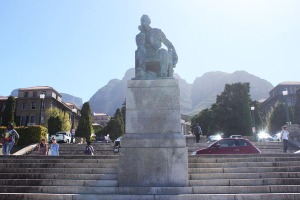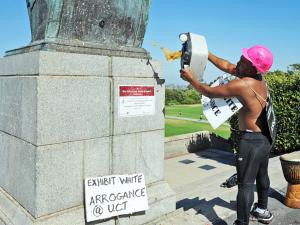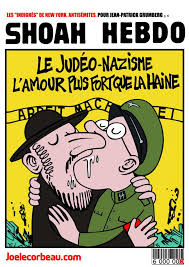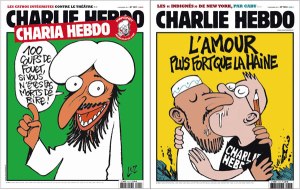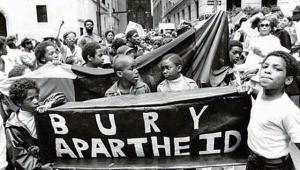The week of 3rd October 2016 will, from here on out, best be known as the week where the future of South African tertiary education potentially (for lack of a better term) “went to shit”. The seeds of destruction were evident from the outset. On Sunday 2nd October, it was announced that, as a result of a majority vote on a referendum, the staff of Wits University would return to work after a university national shutdown, instigated by the Fees Must Fall Movement, caused a three week delay in the academic teaching calendar. The next day, students would return to class to finish off the year. It was a perfect plan, but, sadly, it was not to be. Fees Must Fall protesters, believing that the referendum was an ineffective means of measuring support for their cause, chased academic staff out of their offices on Monday. In response, Vice Chancellor Adam Habib announced that there would be an increased police security presence on campus on Tuesday to assure that students could return to class, uninterrupted by protest activity. However, again, the Fees Must Fall Movement was one step ahead of Habib. Militantly, they came together in their hundreds, disrupted lecturers and then proceeded to battle with the police, turning Wits’s East Campus into a toxic war zone. It was a finely executed plan on the part of the FMF movement who officially claimed Wits as their territory, putting in motion a series of events that has led to the continued shutdown of the university with Habib at their mercy.
Now, all things considered, there’s one specific thing that I want to point out when considering the intentions of the Fees Must Fall Movement. Though these intentions have now become secondary to the spectacle they have created, they are of extreme importance. This is because what they address is the anxieties which are central to the life of a black student, studying towards a tertiary education in South Africa. These intentions are two fold. The first and ,perhaps, most significant one at this point, relates to the need for free education that the ANC government had promised to implement five years ago. The second is to decolonise the university, particularly in terms of the academic syllabuses of its respective faculties. What they highlight is the sense of resentment, instability and uncertainty many black students as they embark on their academic journey.
From the moment these black students enter a university campus for the first time, a narrative of imminent misfortune appears to be set in motion. Firstly, for many, there is a constant financial struggle to complete their degree. Secondly, there’s a constant tension between these students and the academic advantages afforded to their white colleagues. For instance, the medium of instruction at all South African universities is English. This is a language that many white students have known since birth. Therefore, they face few issues in assimilating into the linguistic world of the South African university. For those black students who speak English as a second or even third language, however, achieving this assimilation is an often daunting challenge. Their ability to express complex thoughts and ideas is often hindered by the means of expression available to them. As a white,English speaking educator, a central issue I encounter is how to grapple with this language barrier and its impact on these students’ development. In truth, there really is no definitive solution to this problem. These students have little choice but to adapt and survive within an environment where the only way to succeed is by learning to speak a language which is not their own. Then there is the academic curriculum itself. The issue within the field of Humanities, in this instance, is that though there is a place for the African narrative, it’s constantly framed within the context of a colonial discourse. The reality is that the black student is, in many respects, indeed marginalised and this is is a dilemma that after 22 years of democracy, has gone unaddressed for far too long.
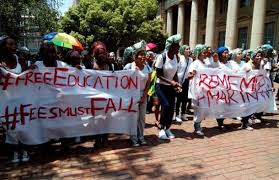
This then is the primary advantage of the Fees Must Fall Movement. It provides a prolific platform to express these concerns in a way which they could not be expressed before. It’s a movement which, in essence, should be a necessary game-changer within the South African academic community. In fact, it has been. However, the question is has its influence really between to the betterment of South African academia, or has it, ultimately, been to its detriment? Of course, as the past weeks have proven, the answer to this question is a highly subjective one. There are those that feel that the tactics employed by the movement are essential to shifting the power balance of the university which they believe has consistently silenced the black voice. Then there are those that believe that such radical moves as initiating a university shutdown in a bid to secure free education have infringed on the rights of other students to learn and, in doing so, exacerbated an already complex and tense situation.
As both a student and an educator, I admittedly struggle to be objective about this situation. The fundamental concern with this movement, I believe, lies with the attitude and approach of its leaders. At the end of Tuesday’s harrowing events, one of these leaders, Busisiwe Seabe, declared on the steps of the Wits Great Hall, that the impact the movement will achieve once free education has been secured will parallel the impact of Nelson Mandela’s release from prison in 1990. I find the conflation of these two events highly problematic. Firstly, whether you look at the FMF leaders as struggle heroes or destructive egomaniacs, one thing we probably all agree on is that none of these leaders come close to Mandela’s stature. To even suggest this is to greatly misrepresent Mandela’s memory. Secondly, it pinpoints to these leaders’ constant manipulation of history. These leaders consistently frame their words and actions through the lens of an apartheid narrative, most significantly that of the 1976 Soweto Uprising which saw thousands of students participating in a march against the implementation of Afrikaans as a medium of instruction in black schools. The consequence of their actions here was a confrontation with apartheid police who opened fire on them, ultimately taking many of these students’ lives. The feeling among followers of the Fees Must Fall Movement is that they are now reliving the same narrative. Subsequently, there have been continuous references to police brutality, the abuse of black bodies, human shields and statements regarding the willingness to take a bullet for the cause.
It’s all very grand and powerful in its execution but it’s not founded in coplete truth. Yes, there are issues of class and racial oppression that continue to exist today. But we are living an entirely different reality. Politically speaking, in South Africa today, we are all equal. There are no methods of racial segregation in place. Our problems are socially constructed. They are not bound by any laws or regulations. Therefore, to perceive the situation through this lens, implies, again, a misrepresentation and misinterpretation of one of the greatest tragedies of the apartheid era. On a broader level, what the leaders are ultimately immersed in is a narrative of Black Consciousness. Yes, Black Consciousness is very relevant to this situation. However, for me, the brand of Black Consciousness practiced here seems to be heavily entrenched in a 1970s way of thinking. The objective of this movement during this period was to celebrate black identity and overthrow white supremacy. Today, though its ramifications remain, white supremacy has, politically, been overthrown and, therefore, the way of thinking and objective needs to change. This, however, seems to be of little concern to the FMF leaders.It might be considered a contentious statement to make but I think it’s necessary to hold the leaders accountable for twisting this narrative as a means to justify both the rhetoric and the violence which has ensued.
By the same token, the leaders have certainly taken advantage of the liberties afforded to them today by also flipping this narrative, making them assume the roles of victim and oppressor in equal measure. There have been numerous death threats targeted at white lives. There has even been a suggestion of murdering a white student to make the movement’s overall intentions clear to Habib. I will admit that the existence of white privilege has played a key role in what’s brought us to this point. However, to conflate all white people into one category, to perceive them all as oppressive forces and enforce both verbal warfare and physical violence against them is not the solution to the problem.
This then leads to my other problem with the movement. A university is a space where students are meant to exchange ideas, challenge one another and engage in productive dialogue. The questions that FMF raises are important and need to be addressed critically and thoughtfully within the intellectual space the university provides. The movement, however, is steeped in absolutes. Apart from their dealings with management which come with their own set of issues, FMF leaders are very quick to dismiss the concerns and arguments made by students who try to engage with them from an alternative position. A student who disagrees with the movement’s tactics is labelled a “sell-out” and then faces some or other form of intimidation. To do this, it appears, is far easier than conversing with these students, something any group that is said to represent students’ interests should be doing. In this regard, I think that the biggest victims of the FMF movement, as a whole, are the leaders and their followers themselves. They are driven by the utopian notion that their lives will be better once they have got free education and decolonised the university space. Yet, they fail to realise that these victories will, ultimately, come with their own challenges. A free education implies that universities will be unable to sustain the amount of students they have at present and, therefore, will need to become more selective. This means that many of these students may face exclusion. On another level, to prompt a complete disengagement with colonial ideas and practices is to potentially distance the university space from the dialogue it is meant to promote.
Indeed, there will be a metaphorical bullet and someone will have to take it. I just hope and pray that our universities will be able to survive and recover from its impact.
Photo credit: http://www.afrikareporter.com/fees-must-fall-protests-and-the-status-of-post-apartheid-south-africa/
